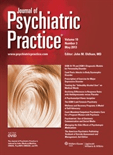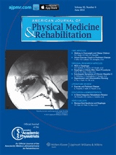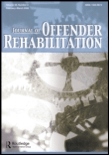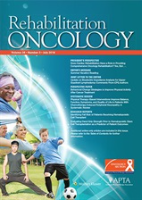
PSYCHIATRIC REHABILITATION JOURNAL
Scope & Guideline
Connecting Research to Real-World Recovery
Introduction
Aims and Scopes
- Recovery-Oriented Practices:
The journal emphasizes research on recovery-oriented practices that support individuals with serious mental illnesses. This includes studies on personal recovery, self-determination, and the role of community engagement in the recovery process. - Community-Based Interventions:
Research published in the journal often focuses on community-based interventions, such as peer support programs, vocational rehabilitation, and psychosocial rehabilitation techniques that promote social inclusion and access to services. - Innovative Therapeutic Approaches:
The journal highlights innovative therapeutic approaches, including the use of technology, creative arts, and participatory action research in psychiatric rehabilitation, showcasing new methodologies to improve patient outcomes. - Cultural Competence in Mental Health Services:
An important focus of the journal is on culturally responsive practices within psychiatric rehabilitation, addressing the specific needs of diverse populations and ensuring equitable access to mental health services. - Impact of Social Determinants on Mental Health:
The journal explores how social determinants, such as employment, education, and social networks, affect mental health outcomes and recovery, providing insights into how to better support individuals in their rehabilitation journey.
Trending and Emerging
- Digital and Virtual Interventions:
There is a rising trend in research focusing on digital and virtual interventions, particularly in response to the COVID-19 pandemic, highlighting the importance of technology in enhancing engagement and support for individuals with serious mental illnesses. - Peer Support and Community Engagement:
The journal is increasingly publishing studies that emphasize the role of peer support and community engagement in recovery, recognizing the value of lived experience and social networks in promoting mental health. - Culturally Responsive Care:
There is a growing emphasis on culturally responsive care practices that address the specific needs of diverse populations, reflecting an increasing awareness of health disparities and the importance of inclusivity in mental health services. - Creative and Arts-Based Therapies:
Research on creative and arts-based therapies is gaining traction, with studies highlighting their effectiveness in enhancing recovery and well-being among individuals with serious mental illnesses. - Holistic Approaches to Mental Health:
An emerging focus on holistic approaches that integrate physical, emotional, and social well-being into mental health care is becoming more prominent, suggesting a shift towards comprehensive care models.
Declining or Waning
- Traditional Inpatient Rehabilitation Models:
There has been a noticeable decline in research focused on traditional inpatient rehabilitation models, as the field shifts towards community-based and recovery-oriented approaches. - Pharmacological Interventions:
Research centered exclusively on pharmacological interventions appears to be decreasing, possibly as the emphasis moves towards holistic and integrated care models that incorporate psychosocial interventions alongside medication. - General Mental Health Awareness Campaigns:
While still relevant, the focus on general mental health awareness campaigns has diminished in favor of more specific, targeted interventions that address the unique challenges faced by individuals with serious mental illnesses. - Longitudinal Studies on Recovery Trajectories:
There seems to be a reduction in longitudinal studies examining recovery trajectories over time, as more immediate and actionable intervention studies gain traction in the field. - Stigmatization and Mental Health:
Research focusing solely on stigmatization without addressing actionable interventions or community responses appears to be waning, reflecting a broader shift towards solutions-oriented research.
Similar Journals

Journal of Psychiatric Practice
Fostering collaboration and knowledge in the field of psychiatry.Journal of Psychiatric Practice, published by Lippincott Williams & Wilkins, is a premier journal dedicated to advancing the field of psychiatry and mental health. With a focus on evidence-based clinical practice, the journal has been a respected resource since its inception, providing a platform for a wide range of articles, including original research, reviews, and case reports from 1997 to the present. As of 2023, it holds a Q3 ranking in Psychiatry and Mental Health, reflecting its influential role in the academic community. The Journal is aimed at researchers, mental health professionals, and students, promoting the dissemination of essential knowledge and innovative practices. Subscribers benefit from the latest findings and discussions in the field while contributing to the ongoing advancements in psychiatric care. Although not classified as open access, the journal ensures wide accessibility to its valuable content, further solidifying its commitment to the mental health discipline.

AMERICAN JOURNAL OF PHYSICAL MEDICINE & REHABILITATION
Pioneering Insights for Effective Rehabilitation StrategiesAmerican Journal of Physical Medicine & Rehabilitation, published by Lippincott Williams & Wilkins, is a leading journal in the field of rehabilitation, dedicated to advancing knowledge in physical medicine and rehabilitation practices. With an established history from 1988 to 2024, this journal serves as a vital resource for clinicians, researchers, and students interested in the multifaceted aspects of rehabilitation science. It holds a commendable Q2 ranking in the Physical Therapy and Sports Therapy fields and a prestigious Q1 position in Rehabilitation, reflecting its impact and relevance in the academic community. The journal's Scopus rankings further highlight its significance, placing it among the top percentile for both rehabilitation medicine and physical therapy. Although it does not currently offer open access options, its accessibility through institutional subscriptions ensures widespread reach. By publishing high-quality research, clinical studies, and reviews, the American Journal of Physical Medicine & Rehabilitation plays a critical role in shaping contemporary rehabilitation practices and improving patient outcomes.

Occupational Therapy International
Bridging theory and practice in occupational therapy.Occupational Therapy International, published by WILEY-HINDAWI, stands as a leading peer-reviewed journal dedicated to advancing the field of occupational therapy. With an ISSN of 0966-7903 and an E-ISSN of 1557-0703, this journal has been an essential resource for researchers and practitioners since its inception in 1994. As an Open Access journal since 2017, it has significantly increased accessibility to innovative research, promoting the dissemination of knowledge and best practices within the discipline. Positioned in the Q2 quartile for Occupational Therapy and ranked #9 out of 31 in Scopus for Health Professions, this journal features high-quality studies that inform clinical practice and contribute to evidence-based interventions. The globally relevant research is enriched by contributions from various perspectives, making it a vital resource for those committed to improving life quality through occupational therapy. Stationed in London, England, the journal continues to reflect its international scope with contributions spanning diverse health systems and cultural contexts, paving the way for future advancements in therapy practices.

Journal of Intellectual Disabilities and Offending Behaviour
Connecting Research to Real-World SolutionsJournal of Intellectual Disabilities and Offending Behaviour, published by EMERALD GROUP PUBLISHING LTD, serves as a pivotal platform for the exploration of interdisciplinary perspectives surrounding the complex interplay between intellectual disabilities and offending behavior. With an ISSN of 2050-8824 and an E-ISSN of 2050-8832, this journal aims to foster insightful discourse and advance knowledge in critical areas including clinical psychology, psychiatric and mental health studies, and forensic medicine. Ranked in the lower quartiles for 2023 across major categories—most notably Q3 in Pathology and Forensic Medicine—this journal seeks to address urgent research gaps and encourage innovative practices that support affected individuals. Although currently operating under a traditional access model, the importance of its contributions to academia cannot be overstated, particularly as it relates to enhancing our understanding of behaviors stemming from intellectual disabilities. Researchers, professionals, and students alike will find valuable resources and a collaborative environment in which to investigate these vital issues, thereby shaping future investigations and interventions.

Substance Abuse and Rehabilitation
Transforming addiction research into actionable solutions.Substance Abuse and Rehabilitation, published by DOVE MEDICAL PRESS LTD, is a leading open-access journal dedicated to the study and treatment of substance abuse and related rehabilitation practices. With its ISSN 1179-8467, this journal provides a vital platform for researchers, clinicians, and students to disseminate their findings and insights in a field increasingly relevant to public health. Since becoming open access in 2010, the journal has enhanced its reach, allowing for a broader audience to engage with cutting-edge research and reviews that address the complexities of substance abuse disorders. The journal aims to foster innovation and interdisciplinary collaboration by publishing high-quality peer-reviewed articles that cover a wide range of topics, including addiction therapy, policy implications, and the social determinants of substance use. As a vital resource within the realm of addiction research, Substance Abuse and Rehabilitation plays a crucial role in driving forward knowledge and practices that can improve outcomes for individuals and communities affected by substance use issues.

Journal of Offender Rehabilitation
Advancing Understanding of Offender RehabilitationJournal of Offender Rehabilitation, published by Routledge Journals, Taylor & Francis Ltd, is a pivotal academic resource in the fields of law and rehabilitation. Established in 1990, this journal has consistently provided a platform for scholarly exchange and innovative research, with a current impact factor reflective of its esteemed position—ranking in the top quartile for law (Q1) and the second quartile for rehabilitation (Q2) as of 2023. With its ISSN 1050-9674 and E-ISSN 1540-8558, the journal engages readers globally, although it does not currently offer open access options. As part of a rapidly evolving discourse on offender rehabilitation, the journal's contributions are vital for academics and practitioners seeking to understand the interplay between law and rehabilitation strategies. Regularly featuring peer-reviewed articles, case studies, and theoretical explorations, the Journal of Offender Rehabilitation not only embraces rigorous research but also aims to inform effective policies and practice in the realm of criminal justice. Its Scopus ranking highlights its relevance, standing at #309 in Social Sciences (Law) and #90 in Medicine (Rehabilitation), making it a crucial reference point for anyone invested in these domains.

Journal of Psychiatric Nursing
Elevating psychiatric nursing standards for a healthier tomorrow.The Journal of Psychiatric Nursing, published by KARE PUBL, is a key resource for researchers, professionals, and students in the fields of psychiatric and advanced nursing. With its open access model initiated in 2017, the journal fosters the dissemination of cutting-edge knowledge and innovative practices in psychiatric nursing care. Based in Turkey, the journal addresses critical issues in mental health, contributing significantly to the dialogue around psychiatric practices within the broader nursing community. As of 2023, it holds a respectable ranking in Scopus, positioned in the Q3 category for Advanced and Specialized Nursing and Q4 for Psychiatry and Mental Health, indicating its growing influence and commitment to advancing research in these domains. With a converging timeline from 2019 to 2024, the journal invites submissions that enhance global understanding and strategies in psychiatric nursing, making it an essential avenue for impactful research in this vital healthcare area.

Archives of Rehabilitation
Transforming Patient Outcomes Through Innovative ResearchArchives of Rehabilitation is a pioneering journal in the field of rehabilitation science, published by NEGAH SCIENTIFIC PUBLISHER. This peer-reviewed publication is dedicated to the dissemination of high-quality research, innovative practices, and comprehensive reviews that contribute to the advancement of rehabilitation methodologies worldwide. The journal seeks to engage researchers, healthcare professionals, and academic scholars by showcasing critical studies, case reports, and theoretical work that address challenges and developments in rehabilitation. Although currently not listed as open access, the journal ensures broad visibility and accessibility for stored research. With its ISSN and E-ISSN both at 2538-6247, Archives of Rehabilitation aims to be an essential hub for knowledge exchange aiming to improve patient outcomes and enhance the practice of rehabilitation.

Rehabilitation Oncology
Empowering Survivors, One Study at a TimeRehabilitation Oncology, published by Lippincott Williams & Wilkins, is an essential academic journal dedicated to the interdisciplinary field of cancer rehabilitation. Since its inception in 2008, it has provided a platform for illuminating research, clinical practices, and innovative therapies aimed at improving the quality of life for cancer survivors. With an ISSN of 2168-3808 and an E-ISSN of 2381-2427, the journal covers a wide spectrum of topics, making significant contributions across various categories including Oncology, Rehabilitation, and Physical Therapy. Although currently not Open Access, the journal has garnered a notable 2023 Impact Factor status, placing it in the Q3 quadrant across multiple relevant disciplines as per the latest Scopus rankings. This reflects its growing influence in the rehabilitation community and offers vital insights for practitioners and researchers seeking to advance their understanding of patient care post-cancer treatment. With its focus on bridging the gap between research and real-world application, Rehabilitation Oncology serves as a vital resource for healthcare professionals committed to enhancing recovery outcomes in their patients.

European Journal of Physical and Rehabilitation Medicine
Pioneering Progress: Your Resource for Evidence-Based RehabilitationWelcome to the European Journal of Physical and Rehabilitation Medicine, the premier peer-reviewed journal focusing on advancements in the fields of physical therapy, sports therapy, and rehabilitation. Published by EDIZIONI MINERVA MEDICA, this journal has established itself as a leading resource since its inception in 2008, now enjoying an impressive Q1 ranking in these disciplines according to 2023 metrics. With an emphasis on rigorous research and innovative clinical practice, the journal facilitates the dissemination of high-quality, evidence-based studies, contributing to the enhancement of patient care and therapeutic strategies. As an Open Access platform since 2022, the journal widens its reach, enabling researchers, clinicians, and students across the globe to access valuable insights without barriers. Residing in Italy, the journal's focus transcends regional confines, engaging a vibrant international community aimed at improving rehabilitation outcomes. Join us in exploring the latest developments that shape the future of rehabilitation sciences.